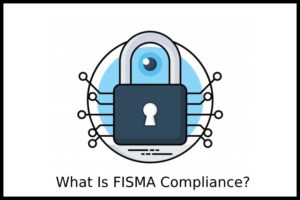In today’s digital world, information is the most important asset of many companies. This forms much of their business decisions and potential to earn money. This is also why others try to target corporate data. To counter this, FISMA compliance was created.
What is FISMA compliance?
FISMA is an abbreviation of the Federal Information Security Management Act. It is a United States federal law from 2002 that created a requirement for federal agencies to develop and implement an information security program. FISMA compliance is actually part of a larger act called the E-Government Act of 2002, which seeks to improve overall electronic services and processes.
All in all, FISMA is among the most important regulations when it comes to federal data security standards. It was established to reduce threats against federal data and information while managing the spending on federal information security. To attain its goals and purpose, FISMA created a set of guidelines that government agencies must adhere to. This scope was later increased to include state agencies that administer federal programs such as Medicare. FISMA compliance is also applicable to any private business that has a contractual relationship with the government.
The Office of Management and Budget, or OMB, released a new set of guidelines in April 2010 that now requires federal agencies to provide real-time data to FISMA auditors for continuous monitoring of FISMA information systems.
What Are FISMA Compliance Requirements?
In January 2003, the FISMA Implementation project was launched, and the National Institute of Standards and Technology, or NIST, played a huge role in this. They created the basic concept and standards required by FISMA. This has included several publications, including FIPS 199, FIPS 200, and NIST 800 series.
The top FISMA compliance requirements are:
- Information System Inventory
Every federal agency and contractor that works with the government is required to keep an inventory of all systems and assets used within the organization. They should also identify integrations of these systems, as well as any others that might be in their network.
- Security Controls
In NIST SP 800-53, it provides an extensive list of suggested security controls for FISMA compliance. Agencies and contractors don’t need to implement all these security controls; however, they are required to implement those that are relevant to their organization and network. Once done, this must be documented in their security plan.
- System Security Plan
FISMA compliance states that agencies need to create a security plan that would be maintained and updated regularly. This plan must also be kept up to date. It should cover security controls, along with security policies and a timetable on scaling other controls.
- Risk Assessments
A key part of FISMA compliance is assessing the risks of an agency’s information security. They can refer to NIST SP 800-30 for guidance on how to properly conduct risk assessment. It should be three-tiered in order to identify security risks from an organizational level to a business process level and finally, to an information system level.
- Certifications and Accreditation
For FISMA compliance, agency heads and program officials need to conduct annual security reviews so they are able to minimize security threats. FISMA Certification and Accreditation can be achieved by agencies through a four-phased process: planning, certification, accreditation, and monitoring.
FISMA Compliance Benefits
The implementation of FISMA has increased the overall security for federal information. With continuous monitoring, agencies could maintain a high level of security and minimize, if not outright eliminate, vulnerabilities in an efficient manner.
Companies that operate in the private sector, especially those that deal with federal agencies, can greatly benefit from FISMA compliance, as it gives them an edge in acquiring new business from other federal agencies.
What Are the Penalties for Non-compliance of FISMA Requirements?
There is a range of potential penalties for both federal agencies and private companies that do not adhere to FISMA compliance regulations, which includes reduction of federal budget, censure by Congress, and of course, damage to their reputation.
Best Practices for FISMA Compliance
Obtaining FISMA compliance should not be difficult. Here are best practices to help an organization meet the requirements set forth by FISMA. It may not be exhaustive, but it will help in attaining the goal of compliance.
- Automatically encrypt all sensitive data: It is ideal to have this as a norm and even supply your team with a tool to encrypt data based on classification level or when it is put at risk.
- Classify information: When creating data, they should be classified based on sensitivity immediately. This helps in prioritizing when to implement security controls.
- Document written evidence of FISMA Compliance: As updates occur, make sure to document all changes done, in order to adhere to FISMA regulations.







